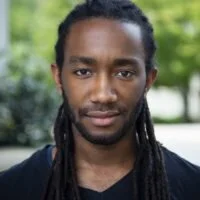This term, I've been lucky to receive three small grants to support a course entitled What Is Transgender Literature? While the total amount of funding I received-- $1,150-- is a fraction of a fraction of a university budget, it made a world of difference to me, to my students, and to the communities with which my class is in conversation. As I close out this course, I'm reflecting on what that funding has meant.
I'm writing this quick thank-you note for a few reasons. First, I've found that being transparent about money is rare in academic spaces. I consider this course successful in part because it was well-resourced. If experiential and community-engaged pedagogy serve as code for "pedagogy that happens at rich schools," they actually compound the inequity they purport to dissolve. I don't want this to be the case, so I'm thinking through the role of access to resources in my own practice. Second, I am genuinely thankful for the opportunity provided by various units at the University of Michigan for the opportunity to connect students with writers, artists, and makers of all types. I want this post to serve as an advertisement about these resources to my colleagues. Thirdly, I want to make a larger point about teaching with marginalized texts and the role of compensation.
My goal for this class was to expose students to a wide variety of transgender media-makers in different genres, forms, and styles, without relying on the single universalizing "special guest" model. I want students to probe and debate what makes a literature "trans," so I invited makers and critics who I knew would have divergent answers to that question. In addition, as someone who has literally published about not treating marginalized knowledge-makers as uncompensated co-teachers, it was crucial that I find a way to pay speakers for their time and energy. Furthermore, I'm a white male teacher, and we're overrepresented in trans academic spaces for a variety of (probably obvious) reasons. Lots of trans studies professors look like me; most trans writers don't look like me. It's crucial that my students understand the limitations of my own authority as an academic critic, and how that authority is compounded by race and class. That means they need to hear from lots of people who aren't me.
Therefore, before the start of term, I reached out to as many trans poets, novelists, essayists, artists, and game-makers as I knew. (Later, I put an offer out on Twitter, and got in touch with a few people I hadn't already met.) I offered $100 in compensation in exchange for a 30-minute video chat with my class. Guests could suggest a piece of their own work or the work of someone they admired, and engage in Q&A with my students about that piece and about "big picture" trans literature questions. I'd handle all the logistics on my end and they wouldn't need to prep anything. No big deal! (By the way, U of M's instructional support services team is amazing and did all the technical stuff. They deserve a giant thank-you too.)
The thing was, when I made these first asks, I didn't really have funding yet. If I'd waited for grant approval before booking guests, I wouldn't have been able to get on people's calendars before the semester started. I thought maybe one or two people would be interested, so I wasn't planning for a significant financial hit. I figured, worst-case scenario, I'd pay people out of my pocket.
Turns out, LOTS of people were interested. I was suddenly way underfunded. My department offered $200 in course development funds, but that only covered two people. Luckily, the department coordinator who fielded my stressed-out emails suggested a few other sources: the Center for Research on Learning and Teaching's Instructional Development Fund, and Arts at Michigan's Course Connection fund.
I wrote careful applications. I was worried that videoconferencing wouldn't "count" as instructional engagement, or that institutions would be skittish about openly funding trans people. I made sure to tie these talks into the university's stated diversity, equity, and inclusion goals, even though I often have mixed feelings about invoking such rhetoric. I emphasized that, even if you haven't heard of these people, they're definitely Very Important in the trans lit and media world. It would be really good for Michigan if they came here, even just virtually, I promised.
In trans life, you ask other people for money a lot. Often, you know that, if you do get anything, it'll largely be other trans people giving it to you. Therefore, the fact that the institution provided me with the maximum awards-- $500 from CRLT, $450 from Arts at Michigan-- was genuinely a surprise. I'm glad these units stepped up, and I'm grateful. I'm pretty sure my students are grateful too, at least if I'm correctly interpreting the eager questions, thoughtful critiques, and goofy laughter that happens during each of these video sessions.
Ultimately, however, I'm mostly thankful for the small cultural change that this money has allowed me to make: establishing a norm in which I directly compensate community members for their intellectual labor. Having done it once makes me much more likely to reach out, find funds, and write pitches, whether I'm at a relatively wealthy institution or not, and encourage others to do so. I'm not ignorant of the systemic ways that major universities accumulate funds, and that the selective distribution of these funds hardly challenges the overall structure. But, for work on the margins, those couple hundred dollars really come to matter. I'm thankful for the opportunity to give that money directly to trans people.






